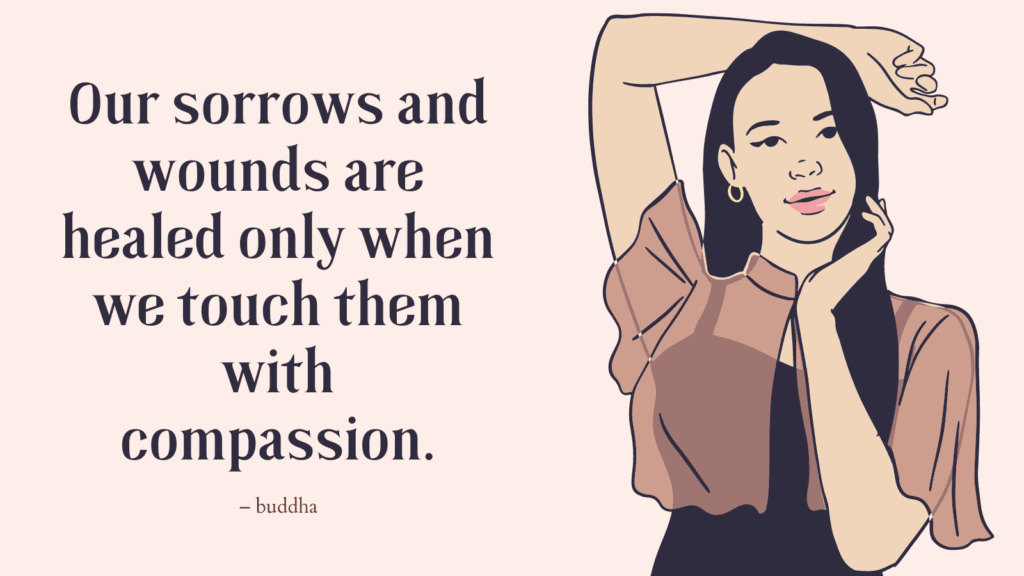In this post you’re going to learn all about how to love someone with complex PTSD.
What Is Complex PTSD?
Complex Post-Traumatic Stress Disorder (C-PTSD) is a psychological condition that is not officially recognized as its own diagnostic category in the Diagnostic and Statistical Manual of Mental Disorders (DSM-5).
Instead, the DSM-5 includes a diagnosis called Post-Traumatic Stress Disorder (PTSD), which encompasses some but not all of the symptoms and complexities seen in C-PTSD.
However, C-PTSD is still widely recognized within the mental health field and is used to describe a set of symptoms that can occur as a result of repeated exposure to traumatic events or environments over an extended period.
These traumatic experiences often involve interpersonal violence, such as childhood abuse, domestic violence, human trafficking, or being held captive.
While the specific criteria for C-PTSD may vary depending on the source, it generally includes symptoms from three main domains:
1. Re-experiencing Trauma: This involves intrusive memories of the traumatic events, nightmares, flashbacks, or emotional reactions triggered by reminders of the trauma.
2. Emotional Dysregulation: Individuals with C-PTSD may experience difficulties regulating their emotions. This can manifest as intense anger, persistent sadness or depression, irritability, or feeling detached and numb.
3. Disturbed Relationships and Self-Perception: C-PTSD often affects one’s sense of self and their ability to form and maintain healthy relationships. Symptoms may include feelings of shame, guilt, or self-blame, a distorted self-image, difficulty trusting others, and challenges with intimacy.
Other common symptoms of C-PTSD that are not included in the criteria for PTSD include difficulties with emotional regulation, chronic feelings of emptiness, identity disturbances, somatic symptoms, and dissociation (feeling disconnected from oneself or reality).
Related: What to Do When Someone with PTSD Pushes You Away?
Challenges of Being In a Relationship with Someone With Complex PTSD
Being in a relationship with someone who has Complex Post-Traumatic Stress Disorder (C-PTSD) can present unique challenges.
C-PTSD is a psychological condition that arises from prolonged exposure to traumatic events or environments, often involving interpersonal violence.
These experiences can have a significant impact on a person’s ability to form and maintain healthy relationships.
Understanding the challenges associated with being in a relationship with someone with C-PTSD can help both partners navigate these difficulties more effectively.
Here are some common challenges and suggestions for managing them:
1. Trust and Attachment Issues
Individuals with C-PTSD often struggle with trust due to past experiences of betrayal or harm.
They may find it challenging to establish and maintain secure attachments.
2. Emotional Dysregulation
People with C-PTSD frequently experience intense emotional swings and struggles with emotional regulation.
They may overreact or become emotionally overwhelmed, leading to conflicts within the relationship.
Related: Why Is Trauma Therapy So Hard? (+Best Trauma Healing Exercises To Support Your Recovery)
3. Communication Difficulties
C-PTSD can interfere with effective communication within a relationship.
The individual may struggle to express their needs, fears, or emotions, leading to misunderstandings or conflicts.
4. Intimacy and Sexuality
Trauma, especially of an interpersonal nature, can significantly impact an individual’s capacity for intimacy and sexual relationships.
Some individuals may develop an aversion to physical touch or struggle with dissociation during intimate moments.
5. Caregiver Fatigue
Supporting a partner with C-PTSD can be emotionally demanding, potentially leading to caregiver fatigue or burnout.
Related: 7 Trauma Release Exercises To Support Your Recovery After Trauma
6. Flashbacks and Triggers
Individuals with C-PTSD may experience flashbacks, nightmares, or intense reactions triggered by reminders of their past trauma.
7. Patience and Understanding
Arguably the most critical aspect of being in a relationship with someone with C-PTSD is practicing patience, empathy, and understanding.
Healing from complex trauma takes time, and progress may be slow at times.
Related: Do I Have Trauma? Top 4 Practical Exercises To Support Your Trauma Healing
How to Love Someone with Complex PTSD?
Loving someone with Complex PTSD (C-PTSD) can present unique challenges, but with empathy, understanding, and patience, you can create a supportive and healing environment for your partner.
1. Educate Yourself
Learn about C-PTSD to better understand its symptoms, triggers, and impact on your partner’s life.
This knowledge will help you approach the relationship with compassion and empathy, reducing misunderstandings.
2. Communicate Openly
Encourage open and honest communication with your partner.
Create a safe space where they feel comfortable expressing their feelings and experiences.
Be patient and actively listen without judgment.
Validate their emotions and reassure them that their experiences are valid.
Related: How To Validate Someone’s Feelings Without Agreeing? (+Examples of Validating Statements)
3. Establish Boundaries
Individuals with C-PTSD might struggle with boundaries due to past traumas.
Clearly communicate your boundaries and encourage your partner to establish their own.
Respect each other’s limits and engage in ongoing conversations to ensure both parties feel safe and secure.
4. Support Their Treatment
Encourage your partner to seek professional help from therapists experienced in trauma treatment.
Attend therapy sessions together if appropriate or requested.
Offer support by reminding them to take medications, attend appointments, and engage in therapeutic activities like journaling or art therapy.
Related: Best 15 Inner Child Exercises: How To Connect With Your Inner Child (& Heal Your Childhood Wounds)
5. Foster Safety and Trust
Trauma survivors often struggle with trust. Build a foundation of safety by being trustworthy, reliable, and consistent.
Demonstrate your commitment by keeping your promises, being dependable, and avoiding behaviors that may trigger fear or anxiety.
6. Be Mindful of Triggers
People with C-PTSD may have specific triggers that can evoke intense emotional and physical reactions.
Learn what these triggers are for your partner and support them in managing or avoiding these situations when possible.
With time, you may also identify triggers together and develop strategies to cope with them as a team.
Related: How To Expand Window Of Tolerance? (+FREE Window of Tolerance PDF)
7. Practice Self-Care
Supporting someone with C-PTSD can be emotionally demanding. Remember to take care of yourself to avoid burnout. E
ngage in activities that recharge you and seek support from friends, family, or a therapist for yourself when needed.
Ensure you have a supportive network to turn to for guidance and understanding.
8. Foster a Healing Environment
Encourage your partner to engage in activities that promote healing and self-discovery.
This can include hobbies, self-help books, mindfulness practices, or support groups.
Participate alongside them when appropriate, promoting a sense of togetherness and shared growth.
Related: Best 10 Books For Healing Trauma
9. Be Patient
Recovery from C-PTSD is a long and nonlinear process.
There may be setbacks, relapses, and moments of frustration.
Cultivate patience and understanding, avoiding pressure or expectations of quick progress.
Celebrate small victories and acknowledge the resilience and determination your partner demonstrates along the way.
Conclusion
Remember, it’s essential to approach these suggestions with an understanding that every relationship is unique.
What works for one couple might not work for another.
Your partner’s individual needs and preferences should always be considered.
Prioritize open communication and collaboration, continuing to learn and evolve together as you navigate the complexities of C-PTSD.
Related: Best 10 Books About Childhood Trauma
FAQ
How is C-PTSD different from Post-Traumatic Stress Disorder (PTSD)?
C-PTSD is an expanded form of PTSD that occurs as a result of experiencing chronic, prolonged trauma, such as childhood abuse or ongoing traumatic situations like domestic violence.
Unlike PTSD, which often stems from a singular traumatic event, C-PTSD involves a complex array of symptoms that can include difficulties with emotional regulation, self-esteem, and relational functioning.
Are there any specific triggers for C-PTSD symptoms?
Triggers for C-PTSD symptoms can vary depending on an individual’s unique experiences and associations with trauma.
Common triggers may include reminders of the traumatic events (e.g., people, places, or smells), certain sounds or noises, particular dates or anniversaries, or even specific sensations or emotions that resemble past traumatic experiences.
Triggers can also be internal, such as intrusive thoughts or nightmares.
Can C-PTSD impact the ability to maintain a healthy relationship?
Yes, C-PTSD can have a significant impact on one’s ability to maintain a healthy relationship.
The symptoms associated with C-PTSD, such as hypervigilance, emotional dysregulation, difficulties with trust and intimacy, and overall distress, can hinder effective communication, create misunderstandings, and strain the connection between partners.
However, with proper support, therapy, and understanding, couples impacted by C-PTSD can work together to navigate these challenges and build a healthier relationship.



